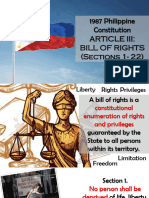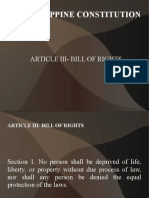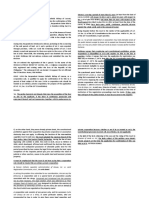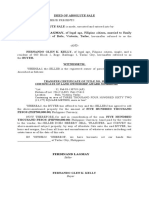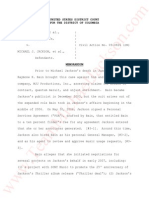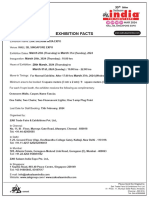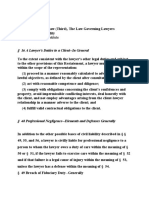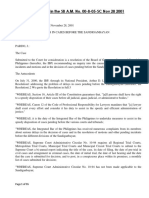Ople Vs Torres
Ople Vs Torres
Uploaded by
IanCopyright:
Available Formats
Ople Vs Torres
Ople Vs Torres
Uploaded by
IanOriginal Description:
Original Title
Copyright
Available Formats
Share this document
Did you find this document useful?
Is this content inappropriate?
Copyright:
Available Formats
Ople Vs Torres
Ople Vs Torres
Uploaded by
IanCopyright:
Available Formats
PRESIDENTIAL ISSUANCES
GR No. 127685. July 23, 1998
FACTS:
This is a petition raised by Senator Blas Ople to invalidate the Administrative Order No. 308 or the Adoption
of a National Computerized Identification Reference System issued by President Fidel V. Ramos.
The petitioner contends that the implementation of the said A.O. will violate the rights of the citizens of
privacy as guaranteed by the Constitution.
ISSUE:
Whether or not A.O. No. 308 violates the right of privacy.
HELD:
Yes.
The right to privacy as such is accorded recognition independently of its identification with liberty; in itself, it
is fully deserving of constitutional protection.
The right of privacy is guaranteed in several provisions of the Constitution:
"Sections 3 (1), 1, 2, 6, 8 and 17 of the Bill of Rights
"Sec. 3. The privacy of communication and correspondence shall be inviolable except upon lawful order of
the court, or when public safety or order requires otherwise as prescribed by law."
"Sec. 1. No person shall be deprived of life, liberty, or property without due process of law, nor shall any
person be denied the equal protection of the laws."
"Sec. 2. The right of the people to be secure in their persons, houses, papers, and effects against
unreasonable searches and seizures of whatever nature and for any purpose shall be inviolable, and no
search warrant or warrant of arrest shall issue except upon probable cause to be determined personally by
the judge after examination under oath or affirmation of the complainant and the witnesses he may produce,
and particularly describing the place to be searched and the persons or things to be seized."
"Sec. 6. The liberty of abode and of changing the same within the limits prescribed by law shall not be
impaired except upon lawful order of the court. Neither shall the right to travel be impaired except in the
interest of national security, public safety, or public health, as may be provided by law."
"Sec. 8. The right of the people, including those employed in the public and private sectors, to form unions,
associations, or societies for purposes not contrary to law shall not be abridged."
"Sec. 17. No person shall be compelled to be a witness against himself."
The right to privacy is a fundamental right guaranteed by the Constitution, hence, it is the burden of
government to show that A.O. No. 308 is justified by some compelling state interest and that it is narrowly
drawn. A.O. No. 308 is predicated on two considerations: (1) the need to provide our citizens and foreigners
with the facility to conveniently transact business with basic service and social security providers and other
government instrumentalities and (2) the need to reduce, if not totally eradicate, fraudulent transactions and
misrepresentations by persons seeking basic services. It is debatable whether these interests are compelling
enough to warrant the issuance of A.O. No. 308.
But what is not arguable is the broadness, the vagueness, the overbreadth of A.O. No. 308 which if
implemented will put our people's right to privacy in clear and present danger. The possibilities of abuse and
misuse of the PRN, biometrics and computer technology are accentuated when we consider that the
individual lacks control over what can be read or placed on his ID, much less verify the correctness of the data
encoded. They threaten the very abuses that the Bill of Rights seeks to prevent.
The petition is granted and declared the Administrative Order No. 308 entitled "Adoption of a National
Computerized Identification Reference System" null and void for being unconstitutional.
You might also like
- Digest - Ople V Torres, 293 SCRA 141Document2 pagesDigest - Ople V Torres, 293 SCRA 141Vic Rabaya80% (10)
- Technologies Impact On Privacy 2 PDFDocument6 pagesTechnologies Impact On Privacy 2 PDFAnonymous kitS7jrNo ratings yet
- 128 Morfe v. Mutuc - DigestDocument2 pages128 Morfe v. Mutuc - Digestadee100% (1)
- Ople Vs Torres GR No 127685 23 July SummaryDocument7 pagesOple Vs Torres GR No 127685 23 July SummaryOnireblabas Yor OsicranNo ratings yet
- Sample Irrevocable Trust For California With Spendthrift ProvisionDocument4 pagesSample Irrevocable Trust For California With Spendthrift ProvisionStan Burman67% (3)
- The Voice ApplicationDocument19 pagesThe Voice ApplicationJesse Curbside-Prophet Mercer100% (1)
- Material AlterationDocument8 pagesMaterial AlterationSimranNo ratings yet
- Ople Vs TorresDocument2 pagesOple Vs TorresMaria Lourdes Nacorda GelicameNo ratings yet
- Ople Vs Torres DigestDocument3 pagesOple Vs Torres DigestPatrick TanNo ratings yet
- Ople Vs TorresDocument4 pagesOple Vs TorresJon Joshua FalconeNo ratings yet
- Case Digest - Ople Vs TorresDocument3 pagesCase Digest - Ople Vs TorresZed VilNo ratings yet
- Ople vs. Torres, G.R. No. 127685 July 23, 1998 FactsDocument2 pagesOple vs. Torres, G.R. No. 127685 July 23, 1998 FactsRich ReyesNo ratings yet
- Ople Vs TorresDocument3 pagesOple Vs TorresSarah Jane UsopNo ratings yet
- Political Law Case DigestDocument16 pagesPolitical Law Case DigestSherine Lagmay RivadNo ratings yet
- Ople v. Torres, G.R. No. 127685, July 23, 1998Document2 pagesOple v. Torres, G.R. No. 127685, July 23, 1998Baisy VillanozaNo ratings yet
- Ople Vs Torres July 23 1998 DigestDocument3 pagesOple Vs Torres July 23 1998 DigestJunisa Duluan KimamaoNo ratings yet
- Ople V Torres National Computerized Identification ProgramDocument3 pagesOple V Torres National Computerized Identification Programlaserna0311No ratings yet
- Week 8 9.Document39 pagesWeek 8 9.Jared FradejasNo ratings yet
- Ople V TorresDocument2 pagesOple V TorresKylie Kaur Manalon DadoNo ratings yet
- Admin Cases TomorrowDocument24 pagesAdmin Cases TomorrowReyrhye RopaNo ratings yet
- Blas Ople vs. Ruben TorresDocument3 pagesBlas Ople vs. Ruben TorresTeresa CardinozaNo ratings yet
- Facts of The Case:: Blas F. Ople, vs. Ruben D. Torres Et AlDocument2 pagesFacts of The Case:: Blas F. Ople, vs. Ruben D. Torres Et AlKatrina Anne Layson YeenNo ratings yet
- Case Digest On PrivacyDocument14 pagesCase Digest On PrivacyWILMAR PLANCIA SALUTANo ratings yet
- Week 8 9 20240917114248 1Document40 pagesWeek 8 9 20240917114248 1vanguardianinafaithb12eabm3No ratings yet
- Ople Vs Torres Et NowDocument2 pagesOple Vs Torres Et Nowvennyse_5131994No ratings yet
- Ople Vs Torres Case DigestDocument7 pagesOple Vs Torres Case Digestzanjknight100% (2)
- Ople V Torres Case DigestDocument1 pageOple V Torres Case DigestRodrigo Agustine CarrilloNo ratings yet
- (A38) LAW 121 - Ople vs. Torres (G.R. No. 127685)Document4 pages(A38) LAW 121 - Ople vs. Torres (G.R. No. 127685)m100% (5)
- Week 8 9 Lesson On Living On The IT Era 2Document24 pagesWeek 8 9 Lesson On Living On The IT Era 2fernandezr1387No ratings yet
- Ople Vs Torres - Case DigestDocument1 pageOple Vs Torres - Case DigestJet jet NuevaNo ratings yet
- Cdi GmailDocument16 pagesCdi GmailLemuelito ButronNo ratings yet
- Article Iii 1 11Document13 pagesArticle Iii 1 11John Dave V. VillarmenteNo ratings yet
- Ople Vs TorresDocument2 pagesOple Vs TorresSarah Jane U UsopNo ratings yet
- Bill of RightsDocument4 pagesBill of RightsRichardNo ratings yet
- 1St CD Ople vs. Torres: SummaryDocument4 pages1St CD Ople vs. Torres: SummaryJunisa Duluan KimamaoNo ratings yet
- Article III Bill of RightsDocument6 pagesArticle III Bill of RightsGiselle Geroy100% (3)
- Admin Law DigestDocument34 pagesAdmin Law DigestRosalia L. Completano LptNo ratings yet
- Ople Vs Torres G.R. No. 127685. July 23, 1998 Facts: Petitioner Ople Prays That The Court Invalidate Administrative Order No. 308 EntitledDocument1 pageOple Vs Torres G.R. No. 127685. July 23, 1998 Facts: Petitioner Ople Prays That The Court Invalidate Administrative Order No. 308 Entitledangelica balatongNo ratings yet
- Right To Privacy-Freedom of SpeechDocument21 pagesRight To Privacy-Freedom of SpeechiheartyoulianneNo ratings yet
- Lesson 5 Pol Gov PPT CRS For Discussion 2Document45 pagesLesson 5 Pol Gov PPT CRS For Discussion 2Lexxy FontanillaNo ratings yet
- Ople v. Torres, GR 127685, July 23, 1998Document3 pagesOple v. Torres, GR 127685, July 23, 1998Valerie PascualNo ratings yet
- Ople v. Torres G.R. No. 127685Document1 pageOple v. Torres G.R. No. 127685Rhea CalabinesNo ratings yet
- Special Proceedings: Arellano University School of LawDocument14 pagesSpecial Proceedings: Arellano University School of LawYana NacinoNo ratings yet
- Bill of Rights - Consti 2Document69 pagesBill of Rights - Consti 2Hao Wei WeiNo ratings yet
- D. Separation of Powers CONSTI CASE DIGESTS COMPILEDDocument14 pagesD. Separation of Powers CONSTI CASE DIGESTS COMPILEDGwyneth SantosNo ratings yet
- 1987 Philippine ConstitutionDocument24 pages1987 Philippine Constitutionselaromanthony100% (1)
- Article IIIDocument2 pagesArticle IIIGj GoNo ratings yet
- Data Protection in IndiaDocument12 pagesData Protection in IndiaItikaGuleriaNo ratings yet
- Article IIIDocument1 pageArticle IIILourdes Marianne MenesesNo ratings yet
- 40 - Ople v. TorresDocument1 page40 - Ople v. TorresRuthImperialNo ratings yet
- Of Whatever Nature and For Any PurposeDocument1 pageOf Whatever Nature and For Any PurposesbbNo ratings yet
- Bill of RightsDocument44 pagesBill of RightsRudas Christine MaeNo ratings yet
- Part 10. Privacy of Communication and Correspondence-1Document14 pagesPart 10. Privacy of Communication and Correspondence-1Nikki ManaloNo ratings yet
- Bill of Rights ModuleDocument11 pagesBill of Rights ModuleVic Angelo RiveraNo ratings yet
- Ople v. Torres 292 SCRA 141. (1998) TOPIC: Void For Vagueness/Over Breadth FactsDocument1 pageOple v. Torres 292 SCRA 141. (1998) TOPIC: Void For Vagueness/Over Breadth FactsIves Delasas PedrosaNo ratings yet
- Applicable LawsDocument1 pageApplicable LawsAngel BangasanNo ratings yet
- Ople Vs Torres - DigestDocument2 pagesOple Vs Torres - DigestRosette G. Reyno100% (1)
- Ople V Torres 293 Scra 141Document1 pageOple V Torres 293 Scra 141Mariano Acosta Landicho Jr.No ratings yet
- 1987 Philippine ConstitutionDocument2 pages1987 Philippine ConstitutionGabriel TafallaNo ratings yet
- Ex Post Facto LawDocument18 pagesEx Post Facto LawJomar Ababa DenilaNo ratings yet
- Federal Constitution of the United States of MexicoFrom EverandFederal Constitution of the United States of MexicoNo ratings yet
- 84republic V Acoje Mining Co. - Power To Establish Pension, Retirement and Other PlansDocument2 pages84republic V Acoje Mining Co. - Power To Establish Pension, Retirement and Other PlansIanNo ratings yet
- 80delta Motors V Mangosing - Power To Sue or Be SuedDocument1 page80delta Motors V Mangosing - Power To Sue or Be SuedIanNo ratings yet
- 12lozano V Delos Santos - de Facto CorporationsDocument2 pages12lozano V Delos Santos - de Facto CorporationsIanNo ratings yet
- 10municipality of Malabang V Benito - de Facto CorporationsDocument2 pages10municipality of Malabang V Benito - de Facto CorporationsIanNo ratings yet
- 11hall V Piccio - de Facto CorporationsDocument1 page11hall V Piccio - de Facto CorporationsIanNo ratings yet
- 8commissioner V Manning - Capitalization, Treasury SharesDocument2 pages8commissioner V Manning - Capitalization, Treasury SharesIanNo ratings yet
- 7clavecilla V Antillon - Principal OfficeDocument1 page7clavecilla V Antillon - Principal OfficeIanNo ratings yet
- 14chiang Kai Shiek V CA - de Facto CorporationsDocument1 page14chiang Kai Shiek V CA - de Facto CorporationsIanNo ratings yet
- 4red Line Transportation V Rural Transit - Corporate NameDocument2 pages4red Line Transportation V Rural Transit - Corporate NameIanNo ratings yet
- 15asia Banking Corp. V Standard Products - de Facto CorporationsDocument1 page15asia Banking Corp. V Standard Products - de Facto CorporationsIanNo ratings yet
- 137dulay Enterprises V CA - Withdrawal of Stockholders, DissolutionDocument2 pages137dulay Enterprises V CA - Withdrawal of Stockholders, DissolutionIanNo ratings yet
- 139roman Catholic Apostolic Church V LRC - Corporation SoleDocument3 pages139roman Catholic Apostolic Church V LRC - Corporation SoleIanNo ratings yet
- 141republic V CA - Corporation SoleDocument2 pages141republic V CA - Corporation SoleIanNo ratings yet
- 9CIR V ST Luke's Medical Center - Tax ExemptionsDocument2 pages9CIR V ST Luke's Medical Center - Tax ExemptionsIanNo ratings yet
- 1segovia V Climate Change Commission - Writ of KalikasanDocument1 page1segovia V Climate Change Commission - Writ of KalikasanIanNo ratings yet
- 1 Genuino v. de Lima, April 17, 2018Document20 pages1 Genuino v. de Lima, April 17, 2018GERALD LUDASNo ratings yet
- Research On Erlinda ChongDocument5 pagesResearch On Erlinda ChongGeorge MelitsNo ratings yet
- CERTIFICATIONDocument4 pagesCERTIFICATIONManoty Nikorem11No ratings yet
- Exam Sample QuestionDocument3 pagesExam Sample QuestionSean NjemaNo ratings yet
- People V JorgeDocument3 pagesPeople V Jorgegelatin528No ratings yet
- Deed of Absolute Sale FerdinandDocument2 pagesDeed of Absolute Sale FerdinandMichie BeeNo ratings yet
- Terminos y Condiciones Streamate ActualizadoDocument10 pagesTerminos y Condiciones Streamate ActualizadoJhonny SalazarNo ratings yet
- Weights and Measures Act GhanaDocument11 pagesWeights and Measures Act Ghanasaisridhar99No ratings yet
- Land Use ActDocument12 pagesLand Use ActNSIKANABASI PETER AKPANNo ratings yet
- Chapter 5 The Elements of An OffenceDocument9 pagesChapter 5 The Elements of An OffenceAmber BoudreauNo ratings yet
- Tan vs. Court of AppealsDocument18 pagesTan vs. Court of AppealsAmerigo VespucciNo ratings yet
- Code of Ethics For EngineersDocument2 pagesCode of Ethics For EngineersSyed RaziuddinNo ratings yet
- Defamation 2016Document85 pagesDefamation 2016Aimi AzemiNo ratings yet
- Appeal Tom AbanDocument6 pagesAppeal Tom AbanJames PeregrinoNo ratings yet
- Tax Evasion by Raymone Bains and V Michael JacksonDocument10 pagesTax Evasion by Raymone Bains and V Michael JacksonTeamMichaelNo ratings yet
- Chief Controlling Revenue Authority - 17-01-19Document23 pagesChief Controlling Revenue Authority - 17-01-19Latest Laws TeamNo ratings yet
- ZAK Salaam India - Singapore Contact FormDocument4 pagesZAK Salaam India - Singapore Contact FormThe mutilated SoulNo ratings yet
- Restatement 3rd - Lawyers' Civil LiabilityDocument7 pagesRestatement 3rd - Lawyers' Civil LiabilityGeorge W. ConkNo ratings yet
- Minarik v. S7G-USA - ComplaintDocument37 pagesMinarik v. S7G-USA - ComplaintSarah BursteinNo ratings yet
- G O 230 Dt.31.05.2014Document1 pageG O 230 Dt.31.05.2014ramuNo ratings yet
- 482 - Quashing-1Document22 pages482 - Quashing-1adv.aktripathi14No ratings yet
- Laws For The Labours of PakistanDocument44 pagesLaws For The Labours of PakistanSono Malik75% (4)
- CITATION: R. v. Suarez-Noa, 2018 ONSC 6925 Court File No.: CR 18-029 DATE: 2018/11/21 Ontario Superior Court of JusticeDocument19 pagesCITATION: R. v. Suarez-Noa, 2018 ONSC 6925 Court File No.: CR 18-029 DATE: 2018/11/21 Ontario Superior Court of Justiceapi-389323529No ratings yet
- Dandy Dungco Case DigestDocument4 pagesDandy Dungco Case DigestJahzel Dela Pena Carpio67% (3)
- RE Delays in The SB A.M. No. 00-8-05-SC Nov 28 2001Document55 pagesRE Delays in The SB A.M. No. 00-8-05-SC Nov 28 2001Arlen RojasNo ratings yet
- Haag v. Barnes, 9 N.Y.2d 554 (1961)Document8 pagesHaag v. Barnes, 9 N.Y.2d 554 (1961)Jovelan V. EscañoNo ratings yet
- Chapter XII Consideration For SharesDocument12 pagesChapter XII Consideration For SharesDaphne Dianne MendozaNo ratings yet































